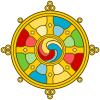11th Dalai Lama
11th Dalai Lama, Khedrup Gyatso | |
|---|---|
ཏཱ་ལའི་བླ་མ་སྐུ་ཕྲེང་བཅུ་གཅིག་པ།, ཧོ་ཏེ་ལུའུ་ཕུའུ།ཅ་མཚོ། | |
 | |
| Title | His Holiness the 11th Dalai Lama |
| Personal life | |
| Born | 9 October 1838 Garthang Monastery, Kham, Qing Tibet |
| Died | 1 March 1855 (aged 16) Potala Palace, Lhasa, Qing Tibet |
| Parents |
|
| Religious life | |
| Religion | Tibetan Buddhism |
| Senior posting | |
| Period in office | 1842–1855 |
| Predecessor | 10th Dalai Lama, Tsultrim Gyatso |
| Successor | 12th Dalai Lama, Trinley Gyatso |
| Part of a series on |
| Tibetan Buddhism |
|---|
 |
The 11th Dalai Lama, Khedrup Gyatso (9 October 1838 – 1 March 1855)[1] was recognized by the Ganden Tripa as the 11th Dalai Lama of Tibet and enthroned in 1842.[1][2] He enlarged the Norbulingka, studied at Sera Monastery, Drepung Monastery and Ganden Monastery, and taught students.
He was recognised as the 11th Dalai Lama in 1841, after being born in Garthang near Dartsedo, the same village where the 7th Dalai Lama, Kelzang Gyatso was born in 1708. He was taken to Lhasa and in 1842, the 7th Panchen Lama, Lobzang Tenpai Nyima, gave him refuge vows, cut his hair and gave him the name of Khedrup Gyatso.[1][2]
In 1842, he was enthroned as the 11th Dalai Lama in the Potala Palace on the Full Moon day of the 4th Lunar month (24 May 1842). In 1846 he became a preliminary monk (rab byung), and in 1848 at the age of eleven years he took the getsul novice vows of monkhood, while both were bestowed by the 7th Panchen Lama[3][1]
He had a residence at the Norbulingka built in 1848, and participated in the annual Zhoton summer festival in Lhasa, while also traveling on pilgrimage to Samye Monastery, Mount Kailash and its Lake Manasarovar, and to other places. He gave public audiences, taught, and stood for his examinations in 1852 and 1853, and passed.[1]
He wrote a book of stanzas, Story of the Monkeys and Birds (Bya sprel gyi gtam-rgyud). It is an allegory of the war at the end of the 18th century between the Tibetans and the Gurkhas ('birds' and 'monkeys' respectively).[4]
He assumed political leadership on the request of Daoguang Emperor in 1854 but died less than one year later on 1 March 1855,[1] becoming the third successive Dalai Lama who died at a young age.
- "During the period of the short-lived Dalai Lamas—from the Ninth to the Twelfth incarnations—the Panchen Lama was the lama of the hour, filling the void left by the four Dalai Lamas who died in their youth."[5]
References
[edit]- ^ a b c d e f Samten Chhosphel, "The Eleventh Dalai Lama, Khendrup Gyatso", Treasury of Lives, 2011.
- ^ a b "His Holiness the Eleventh Dalai Lama, Khedrup Gyatso". The Office of His Holiness The Dalai Lama. Archived from the original on 30 August 2012. Retrieved 16 July 2012.
- ^ Khetsun Sangpo Rinpoche. (1982). "Life and times of the Eighth to Twelfth Dalai Lamas." The Tibet Journal. Vol. VII Nos. 1 & 2. Spring/Summer 1982, p. 50.
- ^ Stein, R. A. (1972) Tibetan Civilization, p. 269. Stanford University Press. ISBN 0-8047-0806-1 (cloth); ISBN 0-8047-0901-7 (pbk)
- ^ The Fourteen Dalai Lamas: A Sacred Legacy of Reincarnation, p. 175. Glenn H. Mullin. Clear Light Publishers. Santa Fe, New Mexico. ISBN 1-57416-092-3.
Further reading
[edit]- Mullin, Glenn H. (2001). The Fourteen Dalai Lamas: A Sacred Legacy of Reincarnation, pp. 361–367. Clear Light Publishers. Santa Fe, New Mexico. ISBN 1-57416-092-3.

